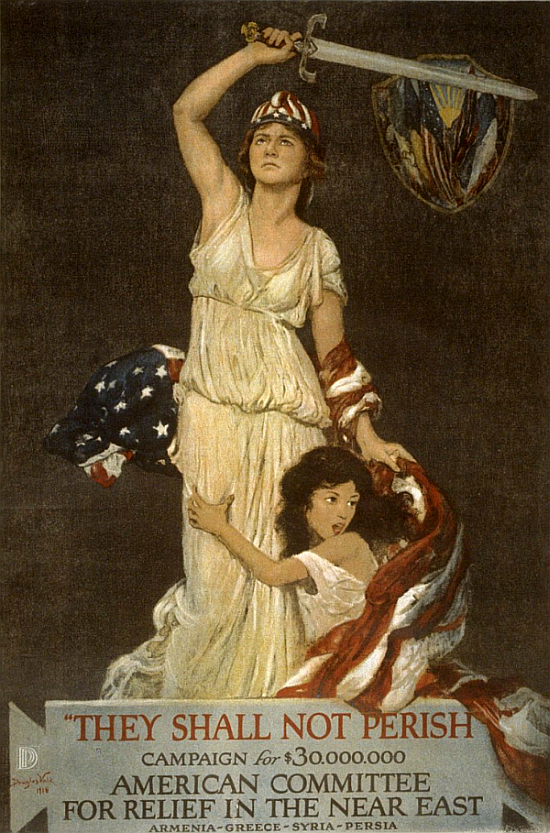 Turkey reacted angrily Thursday to a U.S. congressional committee's vote to condemn the mass killings of Armenians in Turkey in World War I as an act of genocide, calling the decision "unacceptable." (International Herald Tribune)
Turkey reacted angrily Thursday to a U.S. congressional committee's vote to condemn the mass killings of Armenians in Turkey in World War I as an act of genocide, calling the decision "unacceptable." (International Herald Tribune)My reaction to the vote?: "It's about fucking time. Can we get on with things now?"
Of course, one could argue that passing a purely "symbolic" Congressional resolution hardly seems worth the fact that it might create a gigantic diplomatic and strategic crisis. On the other hand, how could such a "symbolic" historical footnote create such a gigantic diplomatic crisis?!
In my experience with Turks as colleagues, acquaintances, and clients, I've found that they are among the most chauvinistic, patriotic, defensive, stubborn, and aggressive people on the planet. A Turkish former employee of mine is also one of the sweetest and happiest people I have ever known. They're human. But they also have major "national identity" issues (not unlike many Americans, one might say... but without the "superpower" mantle that backs it up). You might also say that they have a kind of "inferiority complex" that causes them to act out with major overcompensation.
A Turkish (half ethnic Russian) physician whom I once briefly dated summarized the dilemma of the Turkish collective psychology as a series of questions:
- Are we modern or are we traditional?
- Are we European or are we Asian?
- Are we Muslim or are we Secular?
Of course, the answer to both halves of all these questions is "yes", and it's true for so many cultures and societies that are sort of on the "periphery" (to use a sort of defunct term from ancient social anthropology). However, for Turks, it seems as if there's a whole lot more at stake and riding on the answers to these questions. They're reviled by Europeans in uncountable ways, yet courted by the West as an ally and trading partner. Not for nothing did Atatürk go to great lengths to try to drag his country kicking and screaming into the 20th century -- sometimes employing tactics that seem harsh and "colonialist" in hindsight (and which still create conflict between Turks more than eighty years later).
Despite all this, it's hard to understand why calling out an honest-to-goodness Genocide (the "ցեղասպանության" referred to in the title of the post) that occurred more than ninety years ago can still get people marching on the US Embassy in Ankara today.
I agree with those who essentially say: "Let the Turks have their tantrum over this (as they did with the French a few years ago) to get it out of their system, and then hopefully we can move on."
If the Afrikaaners could get over it and work through the grief dredged up by South Africa's post-independence Truth & Reconciliation Commission, Türkiye should be able to deal with this.
Here's something from the self-help bookshelf for you to chew on, Turkey: Just because you've "done bad things" doesn't make you a "bad country." We'll love and accept you anyway. I can guarantee it.

5 comments:
Delight-ful.
Great post. I'm married to a Turk, so I'm Turkish by injection. This is an issue near and dear to me.
The Turks are taught to beleive that the Armenian massacre was (in short)a way of defending their country. Since this occured before the modern state of Turkey was established-during the tail end of the Ottoman empire- the Turkey established by Mustafa Kemal Ataturk has an identity seperate from 'old' Turkey. Turks don't deny the mass killings-they acknowledge the fact that thousands of Armenians were murdered-but they don't accept the label of genocide, since non-Armenians were killed-including Ottomans-as well. This is what Turkish schoolchildren are taught, and what Turkish media espouses.
As for Ataturk's mission, one of his ideals was separation of church and state, and acceptance of all religions. That is the very definition of secularism. As for the kicking and screaming part, well...he made drastic changes (such as the institution of surnames and change from Arabic script to Latin) overnight because of not wanting to delay modernizing the nation. Not a perfect nor ideal way of going about things, but consider the times.
As for the US, who are we to throw stones or point fingers? What if Turkey (or any other country) decided to call us out on the genocide of indigenous Americans, or fact that blacks were not allowed to vote until 1968, or any of the other transgressions we've made? I can imagine our government and citizens getting mighty defensive, too.
Thanks for bringing light to this!
Jill: Thanks a lot for commenting. Somehow, I didn't realize you were married! But I guess this issue is near to you, in that case!
I agree that the U.S. isn't one to throw stones, but a few notes along those lines:
Some Americans certainly don't like our legacy tarnished and get very defensive, but we've now had decades of public debate (and popular art, especially film and television) about our genocidal Native American policies and racist history with African Americans and other groups. I'm not sure what that says about our evolution as a culture/society, but I think it's something that is still mostly unheard of in Turkey. Being anti-establishment there or an outspoken member of any ethnic minority is still in some ways a very dangerous proposition (cf. Hrant Dink).
I think Turkey is a gigantic conundrum, because its very existence -- the ideal (mythic?) of the state that Atatürk founded -- is still VERY precarious. Istanbul & Anatolia are almost poles apart, held together within the context of a nation-state: this may be a false dichotomy that I'm getting wrong in my limited knowledge, but I think it's probably one of the most volatile (and hence, exciting) countries of the world today in terms of the "problems" it's trying to sort out within itself.
Lastly, though, I want to turn to your comment about the difference between Ottoman Turkey & Modern Turkey: I'll borrow opinions gleaned from various journalists in saying that I think the Turks should find a way within themselves to reconcile the fact that accepting these "crimes" (and/or misdemeanors) of "Old Turkey" doesn't turn "New Turkey" into a state of evil citizens. Modern Germans, for example, had to overcome a lot (that's a grand understatement) and a couple of generations really grappled with forging a new identity separate from, but at the same time addressing, their Nazi past; at this point, I don't think young Germans really grapple with that much anymore, and are confident in and proud of their national identity. I think Turks can (and should) be able to get to the point where they can do the same, but this is why I say they need to deal with their "national self-esteem issue" and not be bogged down and hindered with worry over admitting any "black marks" on their history.
I'm still baffled about where the energy for this issue came from in D.C. Or was it to divert attention from other actions they are trying to sneak past us? I have to admit I was pretty ignorant of this juncture in history until I saw Atom Egoyan's "Ararat" which I am sure has its own biases. When Congress starts getting concerned about Nepal or Burkina Faso, I'll be more impressed. I heard Tucker Carlson mention Burkina Faso in a random reference on NPR this weekend, and I was surprised that he actually knew how to pronounce it. As I recall, Kusala, you're part of the small club of those of us who have been there.
BTW...France recently made it a crime for anyone to deny the Armenian genocide. You can get your ass thrown in jail for doing so.
And yes...I've been married to a Turk for a little over a year now.
Post a Comment